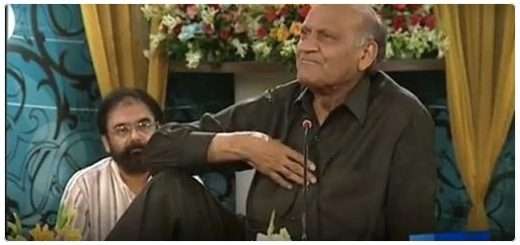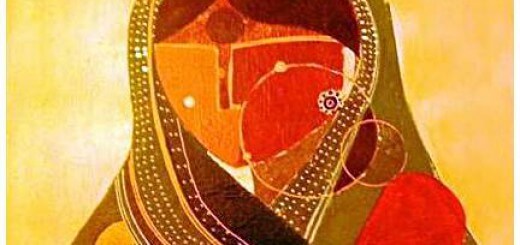Ahmed Faraz (1931-2008) – The Romantic Rebel
With the passing of Ahmed Faraz, not only has Urdu literature lost one of its giants but Pakistan has lost a badly needed voice of courage, compassion and humanity. The poetry of araz was a reflection of the man’s integrity; throughout his life he spoke fearlessly against the military establishment
which he held responsible for destroying his beloved country while simultaneously displaying an uncommon sensitivity to the hardships and travails of common people. In this, Faraz was the natural successor to Faiz Ahmed Faiz, another great poet who preferred exile and imprisonment to compromise with a parasitical and exploitative ruling class.
Ahmed Faraz was born Syed Ahmed Shah in Nowshera village in the N.W.F.P on January 14th, 1931. After studying at Edwards College in Peshawar, he went to obtain Master’s degrees in Urdu and Persian from Peshawar University where he subsequently taught. He became the founding director general of the Pakistan Academy of Letters in 1976 and was later appointed as the chairman of this body. Subsequently, he was appointed as the Chairman of the National Book Council.
Faraz was no stranger to political controversy. In Zulfiqar Ali Bhutto’s time, he was thrown in jail without a trial for daring to call the Pakistan Army
“professional killers” after their brutality in East Pakistan. This happened despite the fact that he was greatly inspired by Bhutto and the PPP and the whole student and labour movement of the 60s. He was again imprisoned and persecuted during the Zia regime as a result of which he went into self imposed exile for six years. In 2006, angered at his statements against the Musharraf regime, the government evicted him and his family from their Islamabad house and threw their possessions out into the street. In 2007, Shaukat Aziz removed him as chairman of the National Book Council. Returning the Hilal-e-Imtiaz earlier conferred upon him, he stated that “my conscience will not forgive me if I remain a silent spectator of the sad happenings around us. The least I can do is to let the dictatorship know where it stands in the eyes of the concerned citizens, whose fundamental rights have been usurpedâ€.
The other side of Ahmed Faraz was that he was an incurable romantic. It is due to his exquisite romantic poetry written in the idiom of classical Urdu and Persian verse that he is by popular consensus the greatest 20th century Urdu poet after Iqbal and Faiz. The lyricism and beauty of his romantic verse is the reason that his ghazals have been sung so often and to such popular acclaim. This romantic poetry (along with his anti-establishment credentials) is also the reason for his immense popularity among the younger generation.
Sunaa hai rabt hai us ko kharaab haalon sai
So apnay aap ko barbaad kar kai dekhate hain
Sunaa hai dard kee gaahak hai chasm-e-naazuk uss kee
So hum bhee uss kee gali sai guzar kai dekhate hain
Sunaa hai uss ko bhee hai shair-o-shaayari sai shagaf
So hum bhee mojaze apnay hunar kai dekhate hain
They say she has an affinity for her sufferers
Let me then destroy myself, and see
They say she hosts pain in the arc of her eyebrows
Let me then pass through that curve, and see
They say she too has an indulgence for verse
Let me then try the miracles of art, and see
Aaj uss nai sharaf-e-humsafari bakhshaa thaa
Aur kuch aisay keh mujhay khwaahish-e-manzil na rahee
Today she granted me the honour of being my traveling companion
And in such a way that I lost all desire for the destination
It has been said that Faraz was no Neruda or Faiz in the sense that he was not a revolutionary. Whether or not this is true, his poetry is infused by the same anger at injustice as is present in all revolutionary poets. In perhaps his most famous poem, entitled Muhaasra (The Siege), Faraz combines his contempt for General Zia’s brutally dictatorial methods with a statement of his own poetic mission in the following immortal words:
“Mera qalam nahin kirdaar uss muhaafiz ka
Jo apnay shehr ko mehsoor kar kai naaz karay
Mera qalam nahin kaasa kisee gadaagar ka
Jo ghaasibon ko qaseedon sai sarfaraaz karay
Mera qalam nahin auzaar uss naqab zan ka
Jo apnay ghar kee chat mein shagaaf daalta hai
Mera qalam nahin uss duzd e neem shab ka rafeeq
Jo bai charaagh gharon par kamand uchaalta hai
Mera qalam nahin tasbeeh uss muballigh kee
Jo bandagi ka bhee har dam hisaab rakhta hai
Mera qalam nahin meezaan aisay aadil kee
Jo apnay chehray pai dohraa naqaab rakhta hai
Mera qalam tau amaanat hai meray logon kee
Mera qalam tau adaalat meray zameer kee hai
Isee liay tau jo likhaa tapaak e jaan sai likhaa
Jabhee tau loch kamaan ka, zabaan teer kee haiâ€.
My pen is not like the character of that protector
Who prides himself on laying siege to his own town
My pen is not the begging bowl of a mendicant
That it should write paeans of praise in honour of usurpers
My pen is not the weapon of that aggressor
Who creates fissures in the roof of his own house
My pen is not the companion of that evening thief
Who casts a net over sorrowful, dark homes
My pen is not the tasbeeh of that preacher
Who deems it necessary to keep count of the Lord’s worship
My pen is not like the scales of a judge
Who wears two different masks to hide his face
My pen is a trust bestowed upon me by my people
My pen is the court of my conscience
That is why I write every line with the fire of my soul
That is why every word hits the target like an arrow
Nor was Faraz without a subtle and disarming sense of humour. It is reported that when he heard about the “shahaadat†of General Zia, he quipped “Ab samajh mein aaya kai shaheed kee maut mein qaum kee zindagi hotee haiâ€! Another time, Faraz heard a knock at his door. A few maulvis had gathered outside. One of them asked, “Can you recite the kalimaâ€? He replied, “Why? Has it changed?â€
It is noteworthy that Faraz’s compassion was not confined to his fellow countrymen or co-religionists. Rather, he was a representative of the humanist tradition of Urdu poetry which had been the hallmark of the authors associated with the Progressive Writers Movement. He has written stirring poems on African revolutionaries (including Nelson Mandela), on the situation in Beirut, on Palestine, and on the tragic loss of lives of American soldiers in the service of an imperialist and ruthless government. In the poem on American soldiers entitled “Kaali Deevaar”, he displays true poetic sensitivity in that despite his hatred of America’s war on Vietnam, he can empathize with ordinary Americans who were used as cannon fodder during this time.
What is truly admirable about Faraz is that his deep compassion was not reserved only for abstract political ideals but also translated itself into the great affection and caring that he brought to his personal relationships. His close friend, Shoaib Sultan (chairman of the Aga Khan Rural Support Programme) relates that when his young daughter died in a tragic accident, Faraz did not leave his side for weeks and wrote the most beautiful poem in her memory. He says that he can never forget the balm that Faraz applied to his wounds during those days.
As a sensitive man, Faraz felt keenly the sense of desolation and fear prevalent in Pakistani society during the Zia era as demonstrated by the following verses:
“Har koi apnee hee aawaaz sai kaamp uthtaa hai
Har koi apnay hee saaei sai hiraasaan jaanaan
Jis ko dekho wohi zanjeer bapaa lagtaa hai
Shehr ka shehr huaa daakhil-e-zindaan jaanaanâ€
Here every man is startled by the sound of his own voice
Here every man is afraid of his own shadow, my love
Everywhere the gaze alights there are people in chains
It seems as if the whole town has been imprisoned, my love
Despite the increasingly intolerant and violent situation in Pakistan over the years, Faraz continued to preach his message of peace. In “Mat qatal karo aavaazon ko” (Don’t Murder These Voices), he says
“Tum apnay aqeedon kai naizay
Har dil mein utaaray jaatay ho
Hum log muhabbat vaalay hain
Tum khanjar kyoon lehraatay ho?
Hum paalanhaar hain phoolon kai
Hum khushboo kai rakhvaalay hain
Tum kis ka lahoo peenay aaye
Hum pyaar sikhaanay waalay hainâ€
You try to impale every heart
On the spears of your beliefs
We are the people of love
Why do you wave daggers in our face?
We are the nurturers of flowers
We are the guardians of fragrances
Whose blood have you come here to drink?
We are the preachers of love
And he never gives up hope:
“Mein kat giroon ya salaamat rahoon, yaqeen hai mujhay
Keh yeh hisaar-e-sitam koi tau giraaye ga
Tamaam umar kee eeza naseebiyon kee qasam
Meray qalam ka safar raigaan na jaaye gaâ€.
Whether I am executed or survive, I have faith
That someone will raze this citadel of oppression to the ground
I swear upon all the sorrows and deprivations of my life
The journey of my pen will not go to waste
To the end of his life, Faraz remained fully committed to the ideals of democracy and justice as witnessed by his close involvement in the lawyers movement of last year. His message of love and tolerance is desperately needed to counter the poison of fanaticism and violence which has permeated Pakistani society. His voice will be sorely missed. May he rest in eternal peace.




![Oil Marketing Companies [OMC] of Pakistan - An Academic Report](https://www.ravimagazine.com/wp-content/uploads/2015/04/pso-520x245.jpg)








